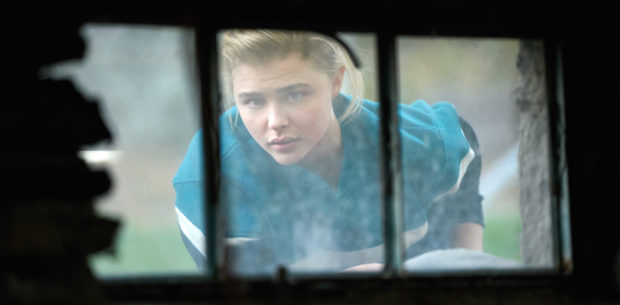Following her debut feature Appropriate Behavior (2014), actor/filmmaker Desiree Akhavan continues her exploration of homosexuality within conservative cultures. Sundance Grand Jury winner THE MISEDUCATION OF CAMERON POST does so in an alarmingly funny way too, carefully dissecting a subset of Christianity from the perspective of youth.
Set in the early 1990s, and immediately giving the narrative some distance from contemporary politics, the eponymous teen Cameron Post (Chloë Grace Moretz) is sent to God’s Promise, a “gay conversion” camp by her conservative guardians. Befriending outsiders Jane Fonda (Sasha Lane) and Adam Red Eagle (Forrest Goodluck), she begins to question many of the truths she had previously been told by adults.
The opportunity for comedy around the subject matter is bountiful, yet he film succeeds in treading that fine line between parody and takedown. Viewers will be frequently caught between two pillars. On the one hand, counsellors Reverend Rick Marsh (John Gallagher Jr.) and the fierce Dr. Lydia Marsh (Jennifer Ehle) equating sports performance as a root cause for SSA (or “same sex attraction”) is naturally hilarious. Yet whenever we get too comfortable, there’s some gut-punching moments that remind us what we are actually laughing about.
Moretz’s career has been marked by some over-the-top performances, which is why her understated appearance here is a perfect showcase for her talents. She is alternative vulnerable and Sasha Lane, who wowed us a few years ago in American Honey, is a commanding presence as Jane Fonda. There still remains a fair bit of mystery about her by the end of the film, as Akhavan and Cecilia Frugiuele’s script (based on the novel by Emily M. Danforth) is not great on individual character development.
On the flip side of the coin are Ehle and Gallagher Jr. The latter’s character is affably drawn, seemingly fuelled by misguided good intentions. Ehle’s psychologist borders on some serious Nurse Ratched realness but steers clear of going full villain. It’s an important distinction in a film that not simply making an argument against conservative Christianity, but against the cluelessness of adults everywhere.
Yet when the film takes some darker turns, exploring the self-harm that comes with self-denial, Akhavan spend a perfunctory amount of time exploring these consequences. There’s a bigger discussion to be had about the wisdom of putting the emotional wellbeing of teens in the hands of dogmatism, but this isn’t it. The solution isn’t quite presented as a simple binary, but Cameron’s brief moment of indecision doesn’t amount to a complete second act.
The final act builds to moments of self-realisation, but takes a few narrative liberties by glossing over the character arcs that led us there. As the film fades out into a moment reminiscent of The Graduate in its ambiguity, most audience members will recognise a universality to Cameron’s journey. The subject matter doesn’t quite get the film it deserves, but it has some laughs along the way.
[stextbox id=”grey” bgcolor=”F2F2F2″ mleft=”5″ mright=”5″ image=”null”] 2018 | US | DIR: Desiree Akhavan | WRITER: Desiree Akhavan, Cecilia Frugiuele | CAST: Chloë Grace Moretz, Sasha Lane, John Gallagher, Jr., Forrest Goodluck, Jennifer Ehle, Quinn Shephard | DISTRIBUTOR: Rialto Distribution, Sydney Film Festival (AUS) | RUNNING TIME: 90 minutes | RELEASE DATE: 9 June 2018 (SFF) [/stextbox]
2018 | US | DIR: Desiree Akhavan | WRITER: Desiree Akhavan, Cecilia Frugiuele | CAST: Chloë Grace Moretz, Sasha Lane, John Gallagher, Jr., Forrest Goodluck, Jennifer Ehle, Quinn Shephard | DISTRIBUTOR: Rialto Distribution, Sydney Film Festival (AUS) | RUNNING TIME: 90 minutes | RELEASE DATE: 9 June 2018 (SFF) [/stextbox]






